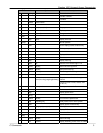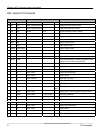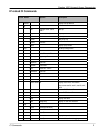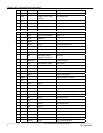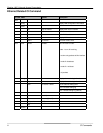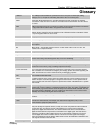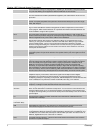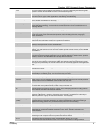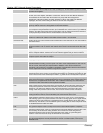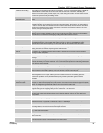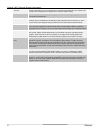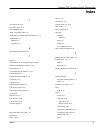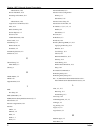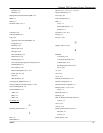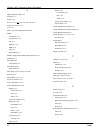
Prestige 1600 Universal Access Concentrator
Glossary
K
FCC The FCC (Federal Communications Commission) is in charge of allocating the electromagnetic
spectrum and thus the bandwidth of various communication systems.
Filters Your Prestige uses filters to decide whether to allow passage of a data packet and/or to make a
call. There are two types of filter applications: data filtering and call filtering.
Flash memory The nonvolatile storage that can be electrically erased and reprogrammed so that data can be
stored, booted and rewritten as necessary.
Frame Relay Frame relay is a metropolitan and wide area networking solution that implements a form of
packet-switching technology. It routes frames of information from source to destination over a
switching network.
FTP File Transfer Protocol. The Internet protocol (and program) used to transfer files between hosts.
Gateway A gateway is a computer system or other device that acts as a translator between two systems
that do not use the same communication protocols, data formatting structures, languages,
and/or architecture.
HDLC HDLC (High-level Data Link Control) is a bit-oriented (the data is monitored bit by bit), link layer
protocol for the transmission of data over synchronous networks.
hop count A measure of distance between two points on the Internet. It is equivalent to the number of
gateways that separate the source and destination.
Host Any computer on a network that is a repository for services available to other computers on the
network. It is quite common to have one host machine provide several services, such as WWW
and USENET.
IANA Internet Assigned Number Authority acts as the clearinghouse to assign and coordinate the use
of numerous Internet protocol parameters such as Internet addresses, domain names, protocol
numbers, and more. The IANA Web site is at http://www.isi.edu/iana.
ICMP Internet Control Message Protocol is a message control and error-reporting protocol between a
host server and a gateway to the Internet. ICMP uses Internet Protocol (IP) datagrams, but the
messages are processed by the TCP/IP software and are not directly apparent to the application
user.
IDSL Uses ISDN transmission technology to deliver data at 128kbps into an IDSL "modem bank"
connected to a router.
IGMP IGMP (Internet Group Management Protocol) is a session-layer protocol used to establish
membership in a multicast group - it is not used to carry user data.
Internet (Lower case i) Any time you connect two or more networks together, you have an internet.
Internet (Upper case I) The vast collection of inter-connected networks that all use the TCP/IP protocols
and that evolved from the ARPANET of the late 60’s and early 70’s.
Intranet A private network inside a company or organization that uses the same kinds of software that
you would find on the public Internet, but that is only for internal use.
IP Internet Protocol (currently IP version 4, or IPv4), is the underlying protocol for routing packets
on the Internet and other TCP/IP-based networks.
IP Multicast Traditionally, IP packets are transmitted in one of either two ways - Unicast (1 sender to 1
recipient) or Broadcast (1 sender to everybody on the network). IP Multicast is a third way to
deliver IP packets to a group of hosts on the network - not everybody.
IP Policy Routing
(IPPR)
IPPR provides a mechanism to override the default routing behavior and alter the packet
forwarding based on the policy defined by the network administrator. Policy-based routing is
applied to incoming packets on a per interface basis prior to the normal routing.
IPCP (PPP) IP Control Protocol allows changes to IP parameters such as the IP address.
ISO International Standards Organization. A voluntary, non-treaty organization founded in 1946,
responsible for creating international standards in many areas, including computers and
communications.
ISP Internet Service Provider: an organization offering and providing Internet services to the public
and having its own computer servers to provide the services offered.
ITU-T International Telecommunications Union, Standardization Sector. ITU-T is the
telecommunication standardization sector of ITU and is responsible for making technical



